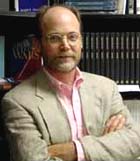|
A Living Lesson
An Essay by James Davison Hunter
 Listen to Hunter's essay. Listen to Hunter's essay.
 | | James Davison Hunter
|
Sept. 30, 2001 -- Among students I've talked to, the recent acts of terrorism have stirred very deep emotions. At the same time, these events have not spawned equally deep reflection about its nature and meaning. The range of opinion I have heard thus far runs from a crude jingoism that wants to see Muslim extremists blown back to the Stone Age to a naivete that wonders why there's so much hatred in the world. The middle ground, it seems, is occupied by those who have declared that they have already dealt with the tragedy and it is time to move on. It strikes me that all three positions are rooted in fear.
Among professors like myself, there's a strong temptation to ignore the recent events in our teaching, to stick closely to the schedule outlined in the syllabus, even when we know that no one, neither students nor ourselves, can concentrate on much else besides the recent events. We must do better.
 |
|
"Perhaps this is a time to face our differences more thoughtfully. They may be more difficult than we imagined."
James Davison Hunter
|
 |
Colleges and universities have a compelling moral obligation to address the wide range of questions, issues and perplexities that emanate from this tragic turn. The insights will range broadly, of course, but virtually every discipline in the liberal arts can find some purchase in these events in ways that can be integrated into the normal course of teaching. It's not just the political scientists who can address the patterns of political leadership in times of trial or the economists who can examine the historical tendencies of market behavior in periods of crisis or even the historians comparing other societies in similar circumstances to our own.
This is an occasion to explore the nature and, indeed, mystery of evil, the character of belief and commitment, goodness and virtue, the dynamics of social solidarity and the fragility of our institutions and habits of life. This is an occasion as well to explore the complexity of cultural traditions and the depth of our cultural difference. We in higher education talk a lot about multiculturalism and tolerance. Well, here is a situation not easily grasped by the reigning rhetoric of that movement. Perhaps this is a time to face our differences more thoughtfully. They may be more difficult than we imagined. Even here, though, we only scratch the surface of the questions and issues that arise from this event.
At the end of the day, our students should come to grips with the fact that history in all of its complexity and significance is unfolding before their very eyes. In this, we have an extraordinary opportunity to engage young adults with this history by turning the vast mass of information available to them into a deeper understanding of their times, the world they're inheriting and themselves. More momentous is the opportunity to reach beyond understanding toward wisdom that will guide them as citizens and future leaders. Not least in all of this, we professors have an opportunity to demonstrate in ourselves that most elusive of academic virtues, humility, humility in the face of all we do not know and cannot explain.
James Davison Hunter is the director of the Institute for Advanced Studies and Culture at the University of Virginia.
|